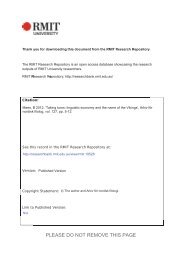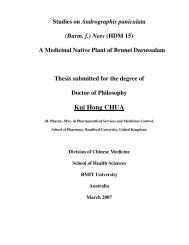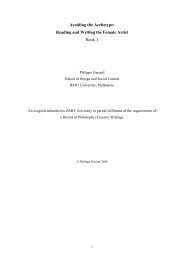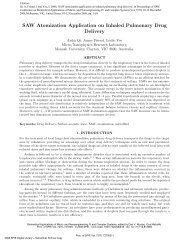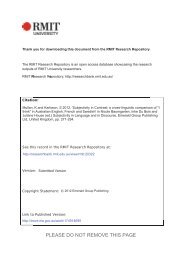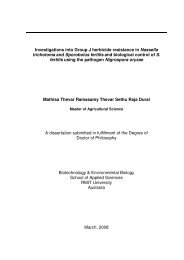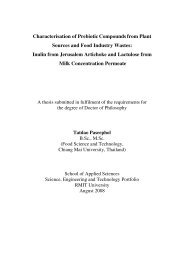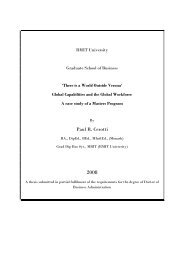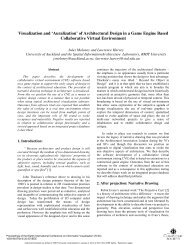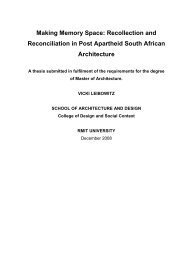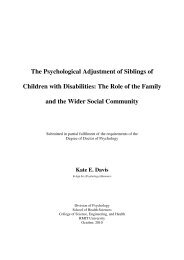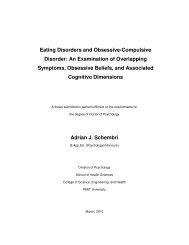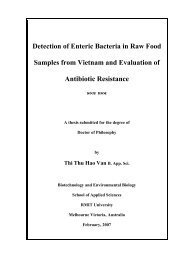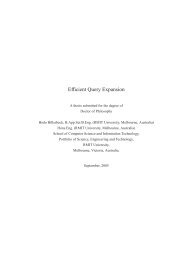Objects in Flux - RMIT Research Repository - RMIT University
Objects in Flux - RMIT Research Repository - RMIT University
Objects in Flux - RMIT Research Repository - RMIT University
You also want an ePaper? Increase the reach of your titles
YUMPU automatically turns print PDFs into web optimized ePapers that Google loves.
<strong>Objects</strong> <strong>in</strong> <strong>Flux</strong><br />
132<br />
it is also reenforced through cont<strong>in</strong>ual conflict with<strong>in</strong> the consumer<br />
environment. As consumers are confronted with commercial control<br />
mechanisms that seek to restrict <strong>in</strong>formation they develop tactics that<br />
overcome these control mechanisms and re-assert their claim for free<br />
and open access.<br />
This struggle with<strong>in</strong> consumer society is essentially one of property<br />
rights, however consumers are not simply exert<strong>in</strong>g a claim of ownership.<br />
The call for free and open access to <strong>in</strong>formation presents a<br />
fundamental challenge to established notions of <strong>in</strong>tellectual property.<br />
By refus<strong>in</strong>g to treat <strong>in</strong>formation as property, by giv<strong>in</strong>g it away or by<br />
render<strong>in</strong>g it a communal resource (as achieved through FOSS copyright<br />
license agreements), practices of consumer production rewrite<br />
the nature of <strong>in</strong>tellectual property and underm<strong>in</strong>e the privatis<strong>in</strong>g force<br />
of capitalism. In A Hacker Manifesto McKenzie Wark claims this<br />
challenge to <strong>in</strong>tellectual property rights signals a revolution with<strong>in</strong><br />
contemporary society. While <strong>in</strong>tr<strong>in</strong>sically l<strong>in</strong>ked to the revolutionary<br />
forces cited by Leadbeater and Miller (2004) and Von Hippel (2005),<br />
the threat here is more fundamental than a simple mirror<strong>in</strong>g of professional<br />
practice. Acts of consumer production disrupt professional<br />
practice through a general disregard for the logic by which it operates;<br />
practices of hack<strong>in</strong>g, modd<strong>in</strong>g and DIY are irreducible to economic,<br />
functional or professional concerns.<br />
While consumer production may be captured by economic structures<br />
and positioned as a form of productive labour, there rema<strong>in</strong>s someth<strong>in</strong>g<br />
excessive, illogical or deliberately disruptive <strong>in</strong> these divergent<br />
acts. This excess emerges <strong>in</strong> the non-utilitarian, the comic, and the fictive<br />
aspects of object modification and may be likened to Bill Brown’s<br />
account of th<strong>in</strong>gness as that which exceeds an object’s materialization<br />
or utilitization (2001). Hack<strong>in</strong>g, modd<strong>in</strong>g and DIY practices are often<br />
proudly non-professional, non-commercial and anti-<strong>in</strong>stitutional.<br />
These productive acts do not supplant one form of logic with another;<br />
rather they run amuck with the established order, challeng<strong>in</strong>g normalized<br />
relations and turn<strong>in</strong>g logical procedures on their head. Consumer<br />
production can best be understood as a form of creative play that seeks<br />
to explore the limits of the system <strong>in</strong> which it operates; as such, it is<br />
endlessly adaptive and responsive to circumstance. Introduc<strong>in</strong>g barriers<br />
<strong>in</strong> an attempt to limit divergent consumer behavior is equivalent to



